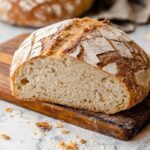Description
This Crusty French Bread recipe yields a flavorful, artisan-style loaf with a golden, crispy crust and a soft, airy interior. Using a mixture of bread and all-purpose flour, molasses for subtle sweetness, and a long rise time, this bread develops complex texture and taste. Baked on a pizza stone with steam from ice cubes, this loaf achieves an authentic bakery-quality crust perfect for sandwiches, toast, or as a side for any meal.
Ingredients
Scale
Wet Ingredients
- 1 3/4 cups warm water (90˚ to 100˚F)
- 1/2 tsp molasses
Dry Ingredients
- 2 1/3 cups unbleached bread flour (290 grams)
- 2 1/2 cups unbleached all-purpose flour (315 grams)
- 1 1/4 tsp instant yeast (quick rise) (1/2 packet)
- 2 tsp fine sea salt
For Dusting
- All-purpose flour
- Semolina flour (for dusting on baking sheet)
Instructions
- Mix Wet Ingredients: In the bowl of a mixer or by hand, whisk together the warm water and molasses until the molasses is fully dissolved to create a slightly sweet liquid base for the dough.
- Combine Dry Ingredients and Form Dough: In a large glass or plastic bowl, whisk together the bread flour, all-purpose flour, instant yeast, and salt. Add the molasses water mixture to the flour mixture and stir until it forms a single mass of dough. Knead using a dough hook or your hands for about 4 minutes until the dough is soft and sticky but does not stick to clean dry fingertips. If too sticky, add flour one tablespoon at a time.
- First Rise and Folding: Cover the dough loosely with plastic wrap and let it rise at room temperature (69-75˚F) for 4 hours. Every hour, wet your hand to keep it from sticking and punch down the dough, folding it over onto itself several times to develop gluten and texture (a total of 3 folds during this rise).
- Shape and Second Rise: After 4 hours, pull the dough edges to the center, turn the dough over and place it in a large bowl that has been well-floured. Sprinkle the top of the dough with flour, cover with a tea towel, and let it rise for another 1 1/2 hours at room temperature.
- Prepare Oven and Stone: Place a pizza stone or inverted baking sheet in the center rack of your oven and a cast iron pan on the bottom rack. Preheat oven and both items to 500˚F. Do not use glass pans at this temperature for safety.
- Dust, Score, and Bake: Generously sprinkle the back of a baking sheet with semolina flour. Invert the risen dough onto this dusted sheet and score the top several times with a sharp knife. Slide the dough gently onto the preheated pizza stone using a spatula if needed. Quickly add 1 cup of ice cubes into the cast iron pan to create steam (avoid dripping on any glass surfaces).
- Bake with Steam and Finish: Bake at 500˚F for 10 minutes to develop a crispy crust with steam. Then reduce oven temperature to 400˚F and bake for another 30-35 minutes until the crust is golden brown. Turn the oven off, crack open the oven door with a wooden spoon to vent, and leave the bread inside for an additional 10 minutes to finish baking gently.
- Cool and Serve: Remove the bread from the oven onto a wire rack and allow it to cool and rest for at least 15 minutes before slicing to preserve texture and flavor.
Notes
- Use warm water between 90˚ to 100˚F to properly activate the yeast without killing it.
- Molasses adds subtle sweetness and improves crust color.
- Folding the dough during the first rise develops gluten structure for better texture.
- Using a pizza stone and steam from ice cubes helps achieve an authentic crusty exterior.
- Allow the bread to cool fully before slicing to prevent a gummy interior.
- If dough is too sticky when mixing, add flour gradually to avoid over-dense bread.
- Don’t use glass baking dishes at 500˚F as they can crack at high temperatures.

